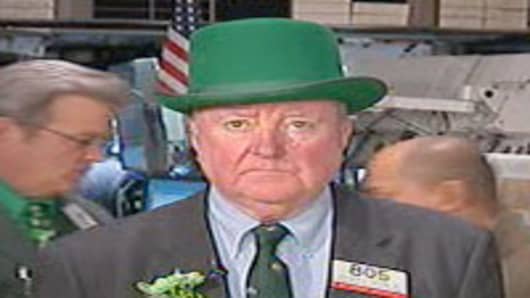"A lot will depend upon what happens with the euro, though — that's been the single, solitary driver of gold and oil and also stocks, so it'll be all about currencies," Cashin said on CNBC.
(Watch Becky Quick's interview with Art Cashin this morning.)
IBM and United Technologies were among the handful of Dow decliners.
Fed Chairman Ben Bernanke was on Capitol Hill today, fighting to maintain the Fed's power to regulate small banksamid all the jockeying over financial reform. The Fed chief said the insight it gets from this role is crucial in determining monetary policy.
This comes a day after the Fed's policy statement that retained the "exceptionally low rates for an extended period" language.
Once again, Kansas City Fed President Thomas Hoenig was the lone dissenter, arguing that keeping rates low for an "extended period" was unnecessary and "could lead to the buildup of financial imbalances."
A new Reuters poll shows 59 percent of banks predict the Fed will raise rates sometime before the end of this year.
Producer prices fell 0.6 percent last month, the largest decline since July, amid a sharp drop in energy prices. Core PPI, which excludes volatile food and energy costs, rose 0.1 percent.
A report on consumer prices is due out tomorrow. The headline and core numbers are expected to tick up 0.1 percent.
Financials were among the day's best performers, with Hartford Financial up over 4 percent after the group announced plans to repay its TARP loan. CIT Group also gained more than 4 percent.
Energy stocks weren't far behind as oil rose, settling near $83 a barrel, following an earlier dip after the EIA reported that crude inventories rose by 1 million barrels last week.
Fordsurged to a five-year highabove $14after Moody's upgraded its debt rating on Ford and said the automaker had potential to improve its finances even further.
Microsoft rose nearly 1 percent. The company lost a $106 million patent verdict in a case involving internet communication methods. Microsoft does say it will appeal.
It's an extremely light day on the earnings calendar but one report of note will come after the bell, when athletic footwear and apparel maker Nike issues its quarterly numbers.
The war of words between the U.S. and China over the yuan continues, with Chinese officials saying they "could not be any clearer" in their repeated commitment to a stable exchange rate. That comes after Congress threatened to levy duties on Chinese exports unless the currency is revalued.
And the Bank of Japan has eased monetary policy by doubling the amount of money available to banks for three-month loans. The move came in a split vote.
Options expirations on Thursday and Friday kept volume light: About 8.64 billion shares changed hands on the major exchanges, a billion fewer than last year's daily average. Advancers outpaced decliners on the Big Board more than 2 to 1.
Still to Come:
THURSDAY: March Madness begins; CPI; weekly jobless claims; Fed's Hoenig, Lacker & Pianalto speak; current account; leading indicators; Philly Fed; earnings from FedEx
FRIDAY: Quadruple witching; S&P index rebalancing
Send comments to cindy.perman@nbcuni.com.



